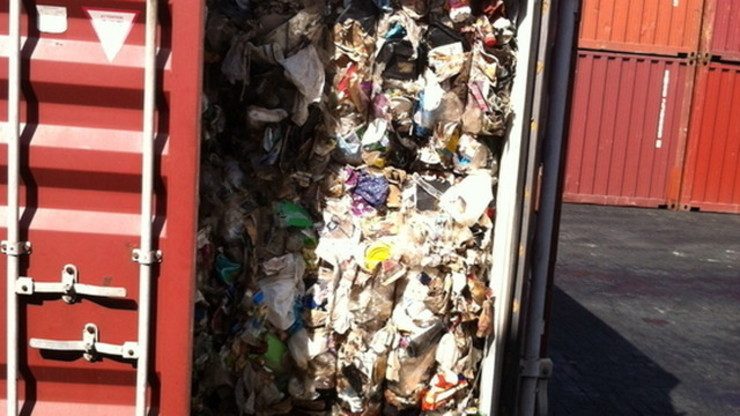SUMMARY
This is AI generated summarization, which may have errors. For context, always refer to the full article.

MANILA, Philippines – Environmental groups have lauded the resolution filed by Senator Miriam Defensor Santiago calling for a probe on the dumping of hazardous wastes in the Philippines by developed countries.
Senate Resolution 919, filed on Monday, September 15, calls for an inquiry in aid of legislation into reported cases of dumping including the 50 container vans of garbage from Canada that remain unclaimed in the Manila Port.
There have also been reports of New Zealand waste exports to the Philippines since 2008.
Santiago’s resolution also calls on the Philippine government to ratify the Basel Ban Amendment, a revision of the Basel Convention that prohibits developed, industrialized countries from sending their toxic garbage to poorer nations whether or not they obtain consent from the destination country, and whether or not the garbage is intended for recycling.
Covering up loopholes
The ratification is necessary, say environmental activists, because unscrupulous parties from developed countries have been known to use these loopholes to smuggle toxic waste.
“Unless the Philippine government ratifies the Basel Ban amendment and reflects its intent in our national laws, the country will continue to be a recipient of hazardous garbage from overseas, made possible under the guise of recycling or recovery,” said Von Hernandez, president of the EcoWaste Coalition and executive director of Greenpeace Southeast Asia.
For instance, the waste from Canada composed of used adult diapers, newspapers, plastic bags, and plastic bottles were declared as plastic scraps for recycling.
The “prior informed consent” from destination countries is another easily exploitable loophole especially when officials with the power to give the consent can be swayed or bribed, say environmentalists.
The Bureau of Customs has sued the local company that was the intended recipient of the Canadian garbage.
The Embassy of Canada in the Philippines has assured “its full cooperation with Philippine authorities in resolving this matter.”
The DENR is still awaiting action from its counterpart in Canada, Environment Canada, to repatriate the vans of garbage.
Santiago’s resolution is timely, they say, because the container vans from Canada, which began arriving in batches since June 2013, are now leaking garbage juice, posing health risks to port employees and residents of nearby communities.
“Once again, Senator Miriam is leading the charge on this issue. Secretary Paje and the DENR establishment should be ashamed. Back in 2007 during the Japan-Philippines Economic Partnership Agreement joint committee hearing, she recommended the ratification of the Basel Ban to the DENR. Seven years later, she’s still at it and the DENR still has its head stuck in the sand,” said BAN Toxics executive director Richard Gutierrez.
The DENR has previously stated that it has kickstarted the process towards ratification of the crucial amendment.
The agency’s Environmental Management Bureau (EMB) said it is consulting with industry players and other stakeholders.
Amendment danger to the economy?
Opposition to the ratification comes primarily from businessmen engaged in battery recycling. Local companies use lead batteries exported from Japan, South Korea, China, US, and Australia which they use to make car batteries.
The Philippine Association of Battery Manufacturers (PABM) say they produce over 5 million units a year and employ 15,000 people.
But according to a study by the Ateneo School of Government, local battery manufacturers can use local sources for used lead batteries since the Philippines is growing as a consumer of electronics.
“The perceived negative impacts of the Basel Ban Amendment to the Philippine economy is based on fear-mongering and is without basis,” said Gutierrez.
But more than the need to safeguard the industry, activists emphasized the urgency of protecting the Filipino public from health risks brought by exported toxic waste.
Hazardous waste, which may come in the form of electronic and medical wastes, contain toxic chemicals like mercy, lead, cadmium, Polybrominated Diphenyl Ethers (PBDEs,) and Polybrominated Biphenyls (PBBs).
This threat cannot be ignored by the world, let alone the Philippine government who is forced to deal with exported garbage as soon as it reaches Philippine soil, said activists.
“We not only need to send a clear signal to the rest of the world – the Philippines is not a dumping ground – but it seems that we need to send the clear signal as well to the President and his Cabinet that the Philippines should be nobody’s dumpsite,” Gutierrez added.
According to the United Nations, 4.6 million tons of hazardous waste have made their way from developed countries to poorer countries from 1998 to 2008. – Rappler.com
Add a comment
How does this make you feel?
There are no comments yet. Add your comment to start the conversation.